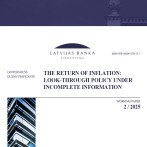The low demand is and will remain an important factor in price development
In August the consumer price rate dropped by 0.7%. While a seasonal price drop for the prices of vegetables and clothing is traditional for August, this year this seasonal drop has been supplemented by one in many other groups of goods because of the still low demand and high unemployment. Albeit an important month-to-month drop has been observed, as a result of base effect, i.e. compared to the increasingly lower price rate last year, the annual deflation continued to decrease and the consumer price rate was only 0.3% lower than in August of 2009.
In addition to the seasonal price drop, the monthly decrease was determined by lower fuel prices that follow the global tendencies in oil price stabilization. Buying a vehicle also became cheaper. Prices of some food items dropped, especially those of bread and meat products. A price decrease is also observed in household goods, furniture and household equipment. The decrease has been moderated by an increase in the prices of regulated services as the prices of water delivery and sewage rose; the prices of compensated medicines also increased. Overall, a month-to-month drop was observed in 46.3% of the total basket of commodities; the prices of 17.6% of goods and services in the basket of commodities remained unchanged.
63.5% of the total basket of commodities prices are under last year's level. The prices of services have dropped notably, with the overall price rate 4.4% under last year's. The prices of many goods, especially clothing, vehicles, and some food products, have also dropped: e.g., the prices of meat are 5.4% lower than a year ago.
Uncertainty as to price development is likely to continue in the near future. External factors, such as changes in the prices of world energy resources and food create a pressure on price rises, whereas the low domestic demand has the opposite effect. As a result, it is difficult to assess the overall effect on price changes.
At the moment it seems clear that the influence of rises in world food prices will continue. The rise in global energy resources prices is stabilizing, so it can be expected that for a while they will have a lesser effect on price dynamics in Latvia. The low domestic demand shows no notable recovery. The improvement in the future assessment by consumers and businesses has stopped, indicating that no rapid change in the situation can be expected in the near future. So there is no basis for rapid raising of prices on the part of businesses and this trend is also reflected in the August data. Moreover, as the heating season begins and the related expenses resume, the demand for other goods and services could suffer a further decline. Thus the increase in production costs, especially in the food industry, will not allow businesses to raise prices to any significant degree as a result of competition and low demand.
Textual error
«… …»






